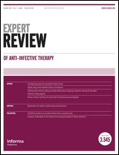
Expert Review of Anti-Infective Therapy
Scope & Guideline
Elevating Standards in Anti-Infective Research
Introduction
Aims and Scopes
- Clinical Management of Infectious Diseases:
The journal emphasizes the latest strategies and guidelines for managing various infectious diseases, particularly those caused by resistant pathogens, including detailed reviews and consensus statements from experts in the field. - Emerging Therapies and Treatments:
It covers novel therapeutic agents and innovative treatment protocols for infections, including antiviral and antifungal therapies, as well as the development of combination therapies to address multidrug-resistant infections. - Antimicrobial Resistance (AMR):
A significant focus is on understanding the mechanisms of antimicrobial resistance and exploring effective approaches to combat it, including stewardship programs and policy implications. - Diagnostic Innovations:
The journal highlights advancements in diagnostic tools and methodologies that enhance the accuracy and speed of infection detection, which is critical for timely and effective treatment. - Public Health Perspectives:
Articles often discuss the epidemiology of infectious diseases and the impact of public health policies on disease management, including the global response to outbreaks and the implications of antimicrobial use in various settings.
Trending and Emerging
- COVID-19 Treatment Innovations:
There is a notable increase in articles addressing the treatment and management of COVID-19, including real-world data on antiviral use and the implications of COVID-19 on other infectious diseases. - Antimicrobial Resistance Research:
Research on the mechanisms, epidemiology, and management of antimicrobial resistance has gained traction, with an emphasis on innovative approaches to counteract resistance and improve treatment outcomes. - Use of Artificial Intelligence in Therapy:
Emerging studies explore the application of artificial intelligence in optimizing antibiotic prescriptions and improving diagnostic accuracy, indicating a shift towards integrating technology in infectious disease management. - Personalized Medicine Approaches:
The trend towards personalized medicine in infectious disease therapy is growing, with a focus on tailoring treatment strategies based on individual patient profiles and pathogen characteristics. - Vaccine Development and Public Health Strategies:
There is an increasing emphasis on vaccine innovation and public health strategies to prevent infectious diseases, particularly in response to emerging pathogens and outbreaks.
Declining or Waning
- Traditional Antifungal Therapies:
As new antifungal agents and strategies emerge, discussions around traditional antifungal therapies have decreased, indicating a shift towards exploring more novel approaches and understanding resistance patterns. - Single-Agent Antibiotic Studies:
Research focusing solely on the efficacy of single-agent antibiotics has waned, as the emphasis shifts to combination therapies and multi-drug regimens to combat resistance. - General Antibiotic Stewardship Guidelines:
While antibiotic stewardship remains critical, there has been a decline in generic discussions, with more focus now on tailored, context-specific stewardship programs rather than broad, one-size-fits-all strategies.
Similar Journals

Annals of Clinical Microbiology and Antimicrobials
Pioneering discussions that shape the future of healthcare.Annals of Clinical Microbiology and Antimicrobials, published by BMC, is a leading open-access journal that has been fostering scientific discourse in the fields of microbiology and infectious diseases since its inception in 2002. With an established reputation for excellence, this journal is positioned in the prestigious Q1 category across multiple disciplines, including Infectious Diseases, Medicine (miscellaneous), and Medical Microbiology as of 2023. This journal serves as a vital platform for researchers, healthcare professionals, and students, promoting the latest advancements in clinical microbiology and antimicrobial research. Access to its invaluable content is open to all, reflecting the commitment to disseminate knowledge universally. The Annals of Clinical Microbiology and Antimicrobials is based in the United Kingdom and continues to pave the way for innovation and discussions that shape the future of clinical practices in microbiology.
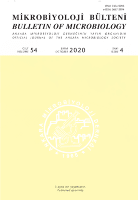
MIKROBIYOLOJI BULTENI
Unveiling the Complexities of Microbial LifeMIKROBIYOLOJI BULTENI, with ISSN 0374-9096, is a prestigious academic journal published by the ANKARA MICROBIOLOGY SOC, located in Ankara, Turkey. Established in 1973, this journal has been a vital conduit for disseminating research in the fields of Immunology, Microbiology, and Infectious Diseases, garnering a reputation as a significant contributor to the scientific community. The journal is currently ranked in the Q3 category within Immunology and Microbiology (miscellaneous), and Infectious Diseases, indicating its impactful presence amidst contemporary research. With access options that may be restricted, MIKROBIYOLOJI BULTENI actively welcomes submissions that advance the understanding of critical microbiological principles and practices, thereby supporting both national and international research efforts. Researchers, professionals, and students are encouraged to explore the latest findings shared in this journal, as it continually shapes the landscape of microbiology and infectious disease studies through its comprehensive and rigorous peer-reviewed publications.
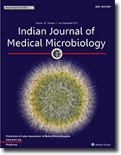
Indian Journal of Medical Microbiology
Discovering Tomorrow's Solutions in Medical Microbiology TodayIndian Journal of Medical Microbiology, published by Elsevier, is a pivotal peer-reviewed journal dedicated to the field of medical microbiology, providing a vital platform for research and scholarship since its inception in 1986. With an Open Access model established in 2001, it ensures the dissemination of scientific knowledge to a global audience, enhancing accessibility for researchers, professionals, and students alike. The journal's scope spans critical areas including immunology, infectious diseases, and microbiology, with an impressive trajectory marked by converged years of publication allowing for a comprehensive exploration of evolving scientific trends. As of 2023, the journal holds a Q3 ranking in Infectious Diseases and Microbiology (medical) and a Q4 ranking in Immunology and Microbiology categories, reflecting its significant yet growing impact in the field. Researchers seeking to contribute to or stay updated on the latest advancements in medical microbiology will find the Indian Journal of Medical Microbiology a valuable resource, as it consistently bridges the gap between emerging science and clinical application.
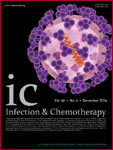
Infection and Chemotherapy
Fostering Dialogues for a Healthier TomorrowInfection and Chemotherapy, an esteemed journal published by the Korean Society of Antimicrobial Therapy, focuses on the dynamic fields of infectious diseases and pharmacology. With an ISSN of 2093-2340 and an E-ISSN of 2092-6448, this peer-reviewed, open-access journal has been providing a crucial platform for research dissemination since 2008. Based in South Korea, it boasts a significant impact in the academic community, as evidenced by its Q2 ranking in both Infectious Diseases and Pharmacology categories for 2023. It holds a Scopus rank of 64 out of 272 in Pharmacology and 98 out of 344 in Infectious Diseases, showcasing its prominence and the quality of research it publishes. With a focus on advancing scientific knowledge, Infection and Chemotherapy is committed to fostering essential dialogues among researchers, clinicians, and students, making it a vital resource for those engaged in the fight against infectious diseases and the development of effective therapeutic protocols.
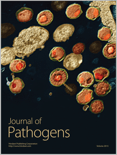
Journal of Pathogens
Transforming Insights into Actionable KnowledgeJournal of Pathogens is a premier peer-reviewed journal published by HINDAWI LTD, focusing on the critical field of microbiology, infectious diseases, and the mechanisms of pathogen interactions with hosts. Since its inception in 2011 as an Open Access journal, it has aimed to provide a platform for high-quality research articles, reviews, and case studies that enhance our understanding of pathogenesis and advance the science of disease control. With its commitment to making research freely accessible, the journal attracts a global audience of researchers, professionals, and graduate students keen on exploring innovative findings and applications in the study of pathogens. While the journal does not currently have an established H-index or category quartiles, its relevance and importance in the field continue to grow as it seeks to bridge knowledge gaps and facilitate impactful discussions in infectious disease research. Located at Adam House, 3rd Floor, 1 Fitzroy Square, London W1T 5HF, England, the Journal of Pathogens invites submissions that contribute to the ever-evolving landscape of pathogen research and public health.
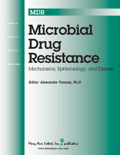
Microbial Drug Resistance
Pioneering Insights in Microbial Resistance and PharmacologyMicrobial Drug Resistance, published by MARY ANN LIEBERT, INC, is a pivotal journal that explores the critical intersection of microbiology and pharmacology with a keen focus on antibiotic resistance and related issues. Since its inception in 1995, this journal has established itself as a vital resource for researchers, healthcare professionals, and students, offering a platform for innovative studies that inform the global response to antimicrobial resistance. With a commendable position in the Category Quartiles, ranked Q2 in Medicine (miscellaneous) and Q2 in Pharmacology for 2023, it caters to a multidisciplinary audience by addressing the implications of microbial resistance within various medical contexts. Although currently non-Open Access, the journal allows subscribers and institutions to access high-quality, peer-reviewed research, directly impacting policy and practice in healthcare settings. Committed to advancing our understanding and combating the challenges posed by resistant microbes, Microbial Drug Resistance remains an essential publication in the fields of microbiology, immunology, and pharmacology.

GERMS
Enhancing public health through collaborative research initiatives.GERMS is a multidisciplinary journal published by the EUROPEAN ACAD HIV-AIDS & INFECTIOUS DISEASES, dedicated to advancing knowledge in the fields of epidemiology, immunology, infectious diseases, and microbiology. Since its inception in 2011, the journal has provided a crucial platform for researchers and practitioners to share innovative studies, clinical findings, and public health insights, with an eye on improving health outcomes globally. With an ISSN of 2248-2997 and a consistent publication trajectory leading up to 2024, GERMS is recognized in the third quartile across several categories, reflecting its growing impact and relevance in the scientific community. Authors and readers benefit from a range of access options, fostering the dissemination of vital research findings. As a journal situated in Romania, it also addresses regional health challenges while contributing to the broader discourse on infectious diseases and public health. GERMS is not just a repository of knowledge, but a vital resource for those engaged in combating infectious diseases and promoting health equity.
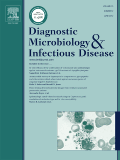
DIAGNOSTIC MICROBIOLOGY AND INFECTIOUS DISEASE
Exploring Innovations in Diagnostic MicrobiologyDIAGNOSTIC MICROBIOLOGY AND INFECTIOUS DISEASE, published by Elsevier Science Inc, is a leading journal in the fields of Infectious Diseases, Microbiology, and Medicine. Since its inception in 1983, this esteemed journal has consistently provided a platform for original research and comprehensive reviews that advance the understanding of diagnostic microbiology and its implications for infectious diseases. With an impressive impact factor placing it in the Q2 category in multiple relevant fields as of 2023, it stands out with Scopus rankings reinforcing its significance in academia, ranking #136 out of 344 in Infectious Diseases and #64 out of 140 in Medical Microbiology. This journal is essential for researchers, healthcare professionals, and students who seek to stay abreast of the latest developments and trends in infectious diagnostics. DIAGNOSTIC MICROBIOLOGY AND INFECTIOUS DISEASE is committed to fostering excellence in research quality and academic rigor, ensuring accessibility to vital knowledge for addressing some of the most pressing health challenges of our time.
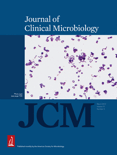
JOURNAL OF CLINICAL MICROBIOLOGY
Contributing to the Future of Healthcare SolutionsJOURNAL OF CLINICAL MICROBIOLOGY, published by the American Society for Microbiology, stands as a premier resource for researchers and professionals in the field of medical microbiology. With an illustrious history dating back to 1975, this journal has consistently provided high-impact research, reflecting its status in the Q1 category among microbiology (medical) journals, and an impressive Scopus rank of 14 out of 140, placing it in the 90th percentile. The journal's commitment to unveiling foundational and innovative studies greatly contributes to understanding human health challenges posed by microbial pathogens. Researchers can expect rigorous peer-reviewed articles that cover a spectrum of topics, from diagnostic methods to clinical epidemiology, fostering a deeper understanding of microbiology's role in healthcare. While this journal does not offer open access options, its substantial impact factor underscores its relevance in shaping the conversation in clinical microbiology. The JOURNAL OF CLINICAL MICROBIOLOGY is indispensable for anyone dedicated to advancing their knowledge and practical skills in microbiology.
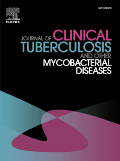
Journal of Clinical Tuberculosis and Other Mycobacterial Diseases
Transforming Clinical Practice in Infectious DiseasesJournal of Clinical Tuberculosis and Other Mycobacterial Diseases is a leading peer-reviewed journal dedicated to advancing the field of infectious diseases, particularly focusing on tuberculosis and other mycobacterial infections. Published by ELSEVIER in the United Kingdom with an impressive open access model since 2015, this journal aims to provide a platform for the dissemination of high-quality research, clinical findings, and innovative methodologies in the management of mycobacterial diseases. With a commendable impact, the journal currently holds a Q2 ranking in multiple categories including Infectious Diseases and Pulmonary and Respiratory Medicine, reflecting its influence in the academic community. The journal is dedicated to serving researchers, healthcare professionals, and students by offering access to essential information that can improve patient outcomes and enhance public health strategies. As the field of mycobacterial diseases continues to evolve, Journal of Clinical Tuberculosis and Other Mycobacterial Diseases remains a crucial resource for those seeking to remain at the forefront of research and clinical practice.